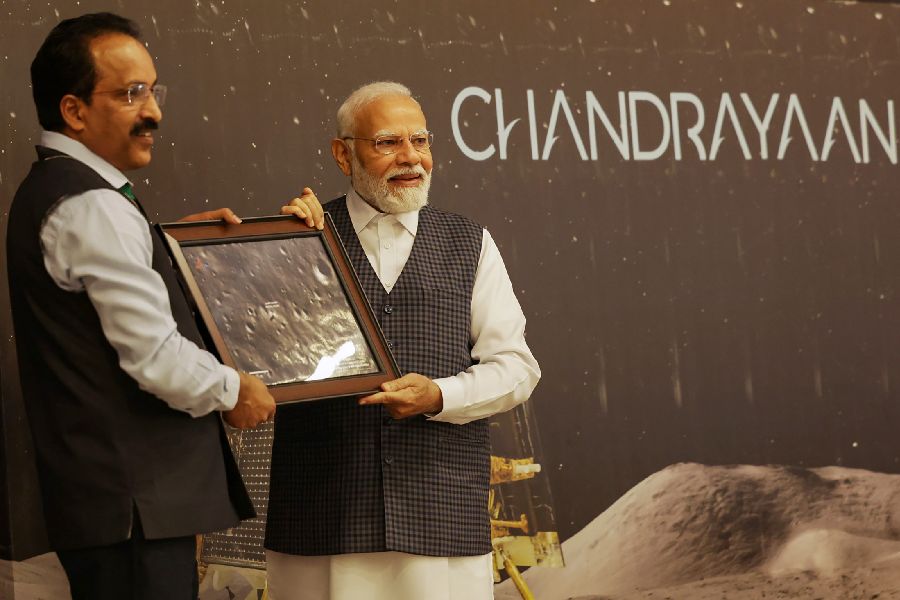“You know, due to the unsuccessful landing of Chandrayaan-2 on the Moon, the morale of all scientists shook, they were very sad. The Prime Minister of our country, Shri Narendra Modi, boosted the courage of our scientists and asked them to try once more. All scientists together tried and improved their work by learning from past experience, so that the ‘lander’ could successfully land on the lunar surface with the launcher.”
So says an “interactive module” prepared by the National Council of Educational Research and Training (NCERT) for nursery and Class I and II children and released by the Modi.2 government on Tuesday. The text, word formulations, several space experts said, gives the impression that the Chandrayaan-3 mission was possible (sic) because of the “encouragement of the Prime Minister”, which is against ISRO’s track record of never giving up after failure. This was reported by Basant Kumar Mohanty in The Telegraph today.
These special supplementary reading modules on the Chandrayaan mission have been brought out by the NCERT, a body which prepares school textbooks, for children from the foundation, preparatory, middle, secondary and senior secondary sections. They were released by education minister Dharmendra Pradhan at a programme in the presence of Indian Space Research Organisation (Isro) chairman S.P. Somanath.
This module, which is meant for the foundation stage, is an interactive document where the teacher initiates a discussion with the children and tells them about Chandrayaan. One of these modules for the secondary stage says Modi had a “crucial role” in the success of Chandrayaan-3. “The leadership of Hon’ble Prime Minister Shri Narendra Modi played a crucial role in the triumph of Chandrayaan-3 and landed our country’s name on the surface of the moon,” it says.
A space analyst who wished to remain anonymous said the text created the impression that the third Moon mission was possible because of the Prime Minister and was not in consonance with Isro’s performance record. He also said the Satellite Launch Vehicle launched by Isro in 1979 had failed. But the agency tried again the next year and was successful. ISRO’s Augmented Satellite Launch Vehicle failed in 1987 and again in 1988, but was launched successfully in 1994. Isro’s Polar Satellite Launch Vehicle failed in 1993, but was successfully launched in the next attempt the following year.
“After every failure, ISRO never gave up. But the text in the NCERT module creates the impression that Chandrayaan-3 was launched only after the Prime Minister asked the scientists to try once more. This may not be matching Isro’s track record,” the space expert said.
The module has pictures of Chandrayaan-3 on the Moon’s surface, the Prime Minister joining the live telecast of the launch and his interaction later with scientists at the Isro headquarters in Bangalore. Moreover, one more module for middle school children seeks to provide information on India’s traditional knowledge related to space, appearing to mix science and mythology.
“Did scientific achievement happen only now?… Literature tells us that it can be traced back through Vymaanika Shastra: ‘Science of Aeronautics’, which reveals that our country had the knowledge of flying vehicles in these days,” the module says, adding: “This book has mind boggling details of construction, working of engines and gyroscopic system.”
“The Vedas, the oldest of Indian texts, makes a mention of various gods being transported on wheeled chariots pulled by animals, usually horses, but these chariots could also fly,” the module adds. The module refers to Pushpak Vimaan, a floating chariot mentioned in the Ramayana.
“It was created by Vishwakarma, the chief architect of gods, out of the dust from the Sun for Brahma. Brahma gave it to Kuber. When Ravana took over Lanka from Kuber, it was used by Ravana as his personal vehicle,” the module says.
Sabrangindia had reported how, NCERT under the present regime has invited controversy after controversy excluding Darwin from science texts inviting sharp criticism from India’s top scientists; “dropping” all mention of Maulana Azad, India’s first education minister and also references to catastrophic bouts of intra-community carnages be it Gujarat 2002 or others. In fact just a few months ago, in July 2023, Suhas Palshikar and Yogendra Yadav distanced themselves from the NCERT after such crude moves at exclusion from the civics curriculum.
On June 9, in an open letter to the Director, NCERT, stating they were “Embarrassed” with the NCERT textbooks, Suhas Palshikar, Yogendra Yadav asked NCERT to drop their names. Following recent controversial changes made to political science textbooks, the political scientists wrote to NCERT asking it to drop their names as chief advisors. We feel embarrassed that our names should be mentioned as chief advisors to these mutilated and academically dysfunctional textbooks,” they said.
The letter was written jointly by Suhas Palshikar and Yogendra Yadav since they have been advisors for political science textbooks for the central body. They released their letter in light of disagreements with controversial changes that the education council recently made to many of its textbooks. “We were never consulted or even informed of these changes … The frequent and serial deletions do not seem to have any logic except to please the powers that be,” Palshikar and Yadav said in their letter to the NCERT director. Prof. Suhas Palshikar and I have dissociated ourselves from the six NCERT textbooks that we had the honour to put together but that have now been mutilated beyond recognition. We have asked NCERT to remove our names from these books.
Related:
Our protest, why we want our names removed from NCERT textbooks: Suhas Palshikar

